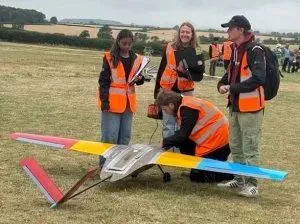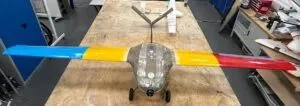Team Bath Drones beat reigning champions Beihang University, and Politecnico di Milano came third.
“The team have worked incredibly hard this year to make our drone even better in terms of how it flies and how it’s made, so to take the overall win is a great way to end our season,” said team leader Ashviny Ramanathan who has just completed a Master’s in aerospace engineering. “. To win this worldwide competition is just amazing.”
 The competition required the drone to autonomously navigate waypoints, deliver a package, and returning to base via further waypoints “while also demonstrating its efficiency, manoeuvrability and sustainability”, according to Bath university. “Bath were the first in the competition to fly a fully autonomous mission, performing: take-off, navigation, payload drop and landing.
The competition required the drone to autonomously navigate waypoints, deliver a package, and returning to base via further waypoints “while also demonstrating its efficiency, manoeuvrability and sustainability”, according to Bath university. “Bath were the first in the competition to fly a fully autonomous mission, performing: take-off, navigation, payload drop and landing.
Team Bath Drones also took home the environmental award for creating the fuselage from flax fibre composite, as well as the scrutineering award their systems, pre-flight processes, and overall professionalism throughout the competition.
And they were runners-up in the innovation, airworthiness and safety categories.
“As well as making a drone that flies beautifully, they took on the additional challenge of reducing the impact of its manufacture by using plant-based composites, which they learned to work with and manufacture themselves,” said Bath mechanical engineering lecturer Samuel Bull.
Universities from Italy, the Netherlands, Estonia, Ireland, China and Turkey made it to the final, which was held at the British Model Flying Association’s national centre near Grantham.
In its 11th year, UAS Challenge is run by the Institution of Mechanical Engineers and involves designing, building and flying a completely autonomous unmanned aerial system weighing up to 10kg.
There are over 100 students in Team Bath Drones, studying aerospace, mechanical and electrical engineering, management and computer science.

